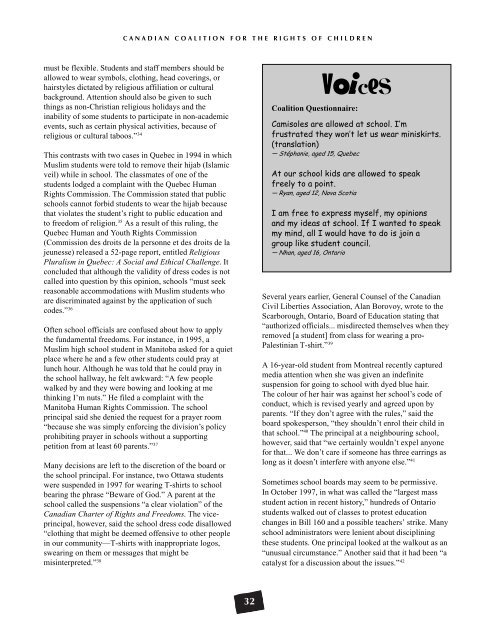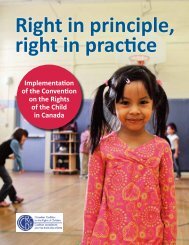Poste - Canadian Coalition for the Rights of Children
Poste - Canadian Coalition for the Rights of Children
Poste - Canadian Coalition for the Rights of Children
Create successful ePaper yourself
Turn your PDF publications into a flip-book with our unique Google optimized e-Paper software.
C A N A D I A N C O A L I T I O N F O R T H E R I G H T S O F C H I L D R E N<br />
must be flexible. Students and staff members should be<br />
allowed to wear symbols, clothing, head coverings, or<br />
hairstyles dictated by religious affiliation or cultural<br />
background. Attention should also be given to such<br />
things as non-Christian religious holidays and <strong>the</strong><br />
inability <strong>of</strong> some students to participate in non-academic<br />
events, such as certain physical activities, because <strong>of</strong><br />
religious or cultural taboos.” 34<br />
This contrasts with two cases in Quebec in 1994 in which<br />
Muslim students were told to remove <strong>the</strong>ir hijab (Islamic<br />
veil) while in school. The classmates <strong>of</strong> one <strong>of</strong> <strong>the</strong><br />
students lodged a complaint with <strong>the</strong> Quebec Human<br />
<strong>Rights</strong> Commission. The Commission stated that public<br />
schools cannot <strong>for</strong>bid students to wear <strong>the</strong> hijab because<br />
that violates <strong>the</strong> student’s right to public education and<br />
to freedom <strong>of</strong> religion. 35 As a result <strong>of</strong> this ruling, <strong>the</strong><br />
Quebec Human and Youth <strong>Rights</strong> Commission<br />
(Commission des droits de la personne et des droits de la<br />
jeunesse) released a 52-page report, entitled Religious<br />
Pluralism in Quebec: A Social and Ethical Challenge. It<br />
concluded that although <strong>the</strong> validity <strong>of</strong> dress codes is not<br />
called into question by this opinion, schools “must seek<br />
reasonable accommodations with Muslim students who<br />
are discriminated against by <strong>the</strong> application <strong>of</strong> such<br />
codes.” 36<br />
Often school <strong>of</strong>ficials are confused about how to apply<br />
<strong>the</strong> fundamental freedoms. For instance, in 1995, a<br />
Muslim high school student in Manitoba asked <strong>for</strong> a quiet<br />
place where he and a few o<strong>the</strong>r students could pray at<br />
lunch hour. Although he was told that he could pray in<br />
<strong>the</strong> school hallway, he felt awkward: “A few people<br />
walked by and <strong>the</strong>y were bowing and looking at me<br />
thinking I’m nuts.” He filed a complaint with <strong>the</strong><br />
Manitoba Human <strong>Rights</strong> Commission. The school<br />
principal said she denied <strong>the</strong> request <strong>for</strong> a prayer room<br />
“because she was simply en<strong>for</strong>cing <strong>the</strong> division’s policy<br />
prohibiting prayer in schools without a supporting<br />
petition from at least 60 parents.” 37<br />
Many decisions are left to <strong>the</strong> discretion <strong>of</strong> <strong>the</strong> board or<br />
<strong>the</strong> school principal. For instance, two Ottawa students<br />
were suspended in 1997 <strong>for</strong> wearing T-shirts to school<br />
bearing <strong>the</strong> phrase “Beware <strong>of</strong> God.” A parent at <strong>the</strong><br />
school called <strong>the</strong> suspensions “a clear violation” <strong>of</strong> <strong>the</strong><br />
<strong>Canadian</strong> Charter <strong>of</strong> <strong>Rights</strong> and Freedoms. The viceprincipal,<br />
however, said <strong>the</strong> school dress code disallowed<br />
“clothing that might be deemed <strong>of</strong>fensive to o<strong>the</strong>r people<br />
in our community—T-shirts with inappropriate logos,<br />
swearing on <strong>the</strong>m or messages that might be<br />
misinterpreted.” 38<br />
32<br />
Voices<br />
<strong>Coalition</strong> Questionnaire:<br />
Camisoles are allowed at school. I’m<br />
frustrated <strong>the</strong>y won’t let us wear miniskirts.<br />
(translation)<br />
— Stéphanie, aged 15, Quebec<br />
At our school kids are allowed to speak<br />
freely to a point.<br />
— Ryan, aged 12, Nova Scotia<br />
I am free to express myself, my opinions<br />
and my ideas at school. If I wanted to speak<br />
my mind, all I would have to do is join a<br />
group like student council.<br />
— Nhan, aged 16, Ontario<br />
Several years earlier, General Counsel <strong>of</strong> <strong>the</strong> <strong>Canadian</strong><br />
Civil Liberties Association, Alan Borovoy, wrote to <strong>the</strong><br />
Scarborough, Ontario, Board <strong>of</strong> Education stating that<br />
“authorized <strong>of</strong>ficials... misdirected <strong>the</strong>mselves when <strong>the</strong>y<br />
removed [a student] from class <strong>for</strong> wearing a pro-<br />
Palestinian T-shirt.” 39<br />
A 16-year-old student from Montreal recently captured<br />
media attention when she was given an indefinite<br />
suspension <strong>for</strong> going to school with dyed blue hair.<br />
The colour <strong>of</strong> her hair was against her school’s code <strong>of</strong><br />
conduct, which is revised yearly and agreed upon by<br />
parents. “If <strong>the</strong>y don’t agree with <strong>the</strong> rules,” said <strong>the</strong><br />
board spokesperson, “<strong>the</strong>y shouldn’t enrol <strong>the</strong>ir child in<br />
that school.” 40 The principal at a neighbouring school,<br />
however, said that “we certainly wouldn’t expel anyone<br />
<strong>for</strong> that... We don’t care if someone has three earrings as<br />
long as it doesn’t interfere with anyone else.” 41<br />
Sometimes school boards may seem to be permissive.<br />
In October 1997, in what was called <strong>the</strong> “largest mass<br />
student action in recent history,” hundreds <strong>of</strong> Ontario<br />
students walked out <strong>of</strong> classes to protest education<br />
changes in Bill 160 and a possible teachers’ strike. Many<br />
school administrators were lenient about disciplining<br />
<strong>the</strong>se students. One principal looked at <strong>the</strong> walkout as an<br />
“unusual circumstance.” Ano<strong>the</strong>r said that it had been “a<br />
catalyst <strong>for</strong> a discussion about <strong>the</strong> issues.” 42




